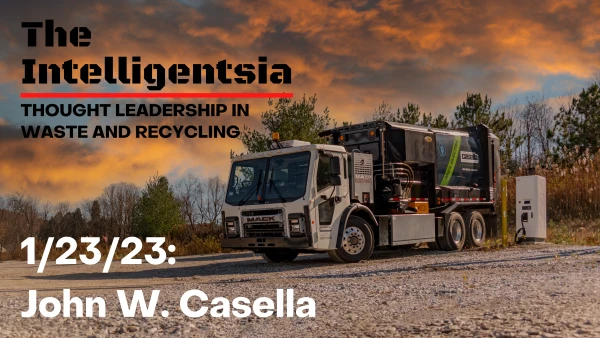
Casella Waste Services had a MACK LR Elecrtric refuse truck pilot in Rutland, Vermont. The following is my Q&A with John W. Casella, Chairman & CEO of Casella Waste Systems:
JOE GILLARD: What will be the biggest challenge this pilot test will need to overcome? Weather conditions? Vehicle maintenance? Power supply? Something else?
JOHN W CASELLA: "We believe that Vermont provides an excellent test environment for our first electric refuse vehicle and think that terrain and weather will be the biggest challenges. We know Vermont’s mountainous terrain and variable weather conditions are challenging for several different reasons even with proven technology. We are confident in our internal maintenance teams and maintenance partners at Mack to ensure that the truck will be ready to go, and we have a reliable charging station installed at our depot that is powered entirely by renewables through our partners at Green Mountain Power, so we feel confident in that regard as well. The main question we want to answer is this: Can we service our customers in a safe and efficient way and get our people home safely at the end of the day with this vehicle? The battery technology has come a long way, even during the period we have been considering this opportunity. We look forward to learning if it can stand up to the rigors of our industry."
JOE: How confident are you that the grid will be able to support expansion of EV refuse trucks?
JOHN: "At this point, we have no concerns about the grid. Like any pilot project, we’re testing for the scalability of the program, so power infrastructure is certainly a piece of that equation. It seems premature to speculate on that, as it will also vary based on the location, number of trucks, etc. As with any new technology being deployed, it will likely be something that is scaled over time and that should benefit all involved."
JOE: Why was Mack selected to become the truck supplier for this pilot?
JOHN: "We have a longstanding and successful relationship with Mack, and specifically with Ballard Mack. We know that Mack can provide a safe, reliable vehicle to service our customers and we’re excited to see how the electric truck performs during the pilot in Vermont. The Mack Ultra Service Agreement was a big selling point for us, knowing that Mack had maintenance plans available and was really looking to be a partner in the implementation process."
JOE: What has been the response from drivers regarding transitioning to electric? Will they require any additional training?
JOHN: "Training for our drivers and technicians was provided by Mack and Battle Motors both on site and at their factories. Training on everything from charging the vehicle to operating was provided to our whole team. Initially, the drivers are a bit skeptical. But the early response is that when they drive it, operationally, it is very similar and has incredible power in the hills. The regenerative breaking is a huge plus, and the drivers seem excited by the opportunity to try something new."
JOE: How will maintenance procedures be updated to accommodate the new truck technology?
JOHN: "We signed an agreement with Mack to cover all repairs and maintenance except tires, brakes and miscellaneous wear items. The expectation is that our maintenance technicians can handle much of the day-to-day issues and learn from the team at Mack as we engage with them on other, more complex maintenance."
JOE: What kind of assistance has the state government provided?
JOHN: "We were fortunate to have this pilot project partially funded through Vermont’s Volkswagen Environmental Mitigation Trust. This allowed us to get the pilot off the ground and eliminate some of the upfront risk in testing the new technology. In 2005 Casella joined the EPA Climate Leaders as a charter member, and in 2012 the company was awarded the EPA’s Climate Leadership Award for Excellence in Greenhouse Gas Emissions after reducing its carbon footprint by more than 45 percent and has recently established a goal to reduce it by another 40 percent by 2030. Our own sustainability journey aligns well with Vermont’s goals as a state, and we are grateful for the continued partnership."
JOE: Do you anticipate that EV expansion will ultimately save money, or is it too soon to tell?
JOHN: "While it is too early to tell, the truck is expected to offset 7,500 gallons of diesel fuel use. And, Because the fleet will be charging with Green Mountain Power, which delivers 100% carbon-free electricity, we expect to eliminate over 78 metric tons of greenhouse gas emissions per year, which is equivalent to taking around 16 passenger vehicles off the road. So, some very clear benefits to the environment and, clear savings in the cost of diesel fuel, but it will take some time to really understand the full payback and savings."
You can find out more about the pilot by watching the video below or visiting their website:
Get curated news on YOUR industry.
Enter your email to receive our newsletters.Latest from Waste Today
- Miami region officials seek WTE plant location
- Clean Harbors faces potential penalty for Ohio fatality
- New Hampshire governor signs leachate management bill
- MSS relocates to new facility in Nashville, Tennessee
- Houston weighs adding a solid waste fee
- Smith & Loveless highlights wastewater treatment system
- Startup proposes medical waste facility in Alabama
- Mount Vernon, Ohio, City Council tightens waste hauling regulations






